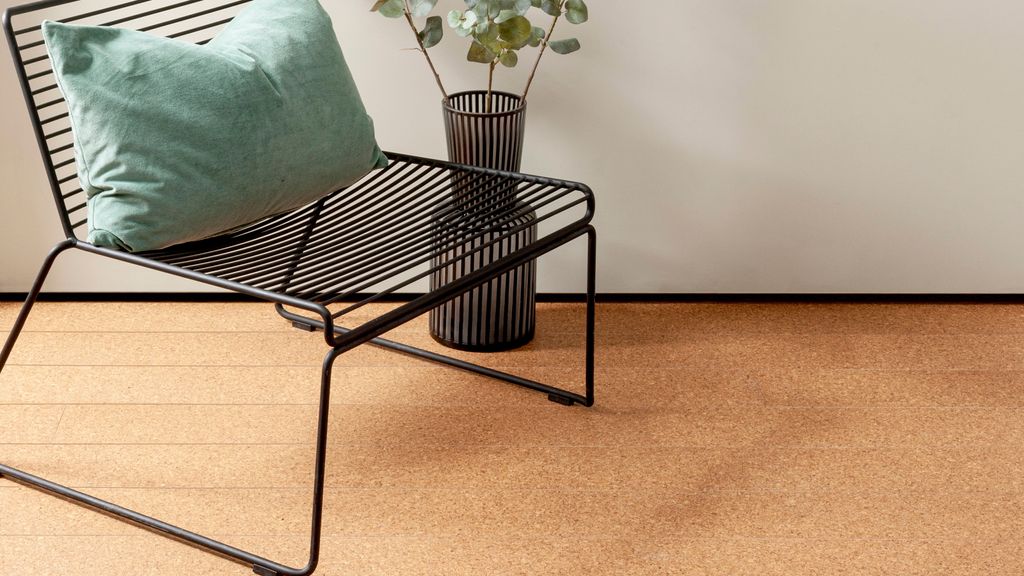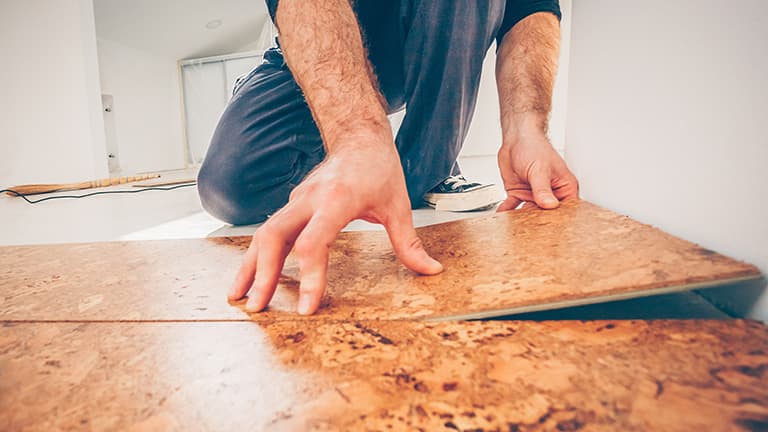Have you ever walked barefoot on a soft, warm surface and felt instantly relaxed? That’s the magic of cork. This natural material, derived from the bark of the cork oak tree, has increasingly become a popular choice for flooring. But, just like any other material, cork backed flooring comes with its own set of advantages and disadvantages. This article will provide a comprehensive guide to help you decide if cork backed flooring is the right fit for your home.

Image: www.homebuilding.co.uk
While the idea of a natural and sustainable flooring option is appealing, determining if cork backed flooring is the best choice for you requires a careful consideration of its unique properties. From the initial installation to its long-term performance, understanding the pros and cons of cork backed flooring can ensure your decision aligns with your needs and expectations. Let’s delve into the details of this eco-friendly flooring option.
The Enchanting Advantages of Cork Backed Flooring
Cork backed flooring is a unique product that combines the natural beauty and comfort of cork with the durability and stability of a backing layer. The backing layer can be made of materials like plywood, MDF, or even recycled rubber, enhancing its overall performance and longevity. Let’s explore the benefits that make cork backed flooring a compelling choice for many homeowners:
1. Comfort Underfoot: Imagine stepping onto a soft, cushioned surface that absorbs the impact of your feet and feels warm to the touch. This is what cork backed flooring offers. Its natural elasticity provides a cushioning effect that makes it incredibly comfortable to walk on, especially for those with sensitive feet or who spend a lot of time standing.
2. Sound Insulation: In the realm of noise reduction, cork backed flooring excels. The porous structure of cork effectively absorbs sound waves, making it a great option for creating a quieter environment in your home. This can be particularly beneficial for apartments, multi-level houses, or areas with high foot traffic.
3. Eco-Friendly and Sustainable: Cork is a renewable resource. Harvesting cork bark doesn’t harm the cork oak trees. In fact, the trees actually benefit from the process as it stimulates new growth. Aside from being sustainable, cork is also biodegradable and completely recyclable, making it a truly eco-friendly flooring choice.
4. Hypoallergenic and Anti-Allergenic: If you or someone in your family suffers from allergies or asthma, cork backed flooring can be a welcome respite. It naturally resists dust mites, mold, and mildew, creating a cleaner and healthier indoor environment.
5. Thermal Insulation: Cork flooring acts as a natural insulator, helping to regulate the temperature in your home. During the winter, it retains heat, keeping your floors warmer. In the summer, it helps to keep your home cooler by reflecting heat.
6. Unique Aesthetics: Unlike traditional hardwood or tile, cork backed flooring offers a distinct visual appeal. Its natural cork layer adds a touch of warmth and sophistication to any space. It comes in a variety of colors, finishes, and patterns, allowing you to personalize your home’s style.
The Potential Drawbacks of Cork Backed Flooring
While cork backed flooring boasts a plethora of advantages, like any other material, it has its drawbacks. A comprehensive understanding of these potential downsides will help you make an informed decision for your home:
1. Susceptibility to Scratches and Dents: Cork is a relatively soft material, making it susceptible to scratches and dents from sharp objects or heavy furniture. This is particularly important to consider in high-traffic areas or households with pets.
2. Limited Water Resistance: Cork is porous, meaning it absorbs moisture. While cork backed flooring is typically coated with a sealant to enhance its water resistance, it’s not suitable for areas that are prone to excessive moisture, such as bathrooms or kitchens. Avoid spills and promptly clean any spills with a damp cloth.
3. Potential for Color Fading: Over time, exposure to direct sunlight can cause the cork to fade. If you expect your floor to receive a significant amount of sunlight, consider using a rug or curtains to protect it.
4. Higher Initial Cost: Cork backed flooring can be more expensive than traditional flooring options like vinyl or laminate. However, its long-term durability and eco-friendly nature can offset the initial investment.
5. Proper Installation: The installation of cork backed flooring requires expertise. It’s essential to hire a professional installer to ensure proper installation and long-term performance. Incorrect installation can lead to issues like uneven floors and gaps.
6. Limited Range of Styles: Compared to other flooring options, the variety of styles and designs in cork backed flooring is relatively limited.
Expert Insights and Actionable Tips for Cork Backed Flooring
“Cork backed flooring offers a unique blend of comfort, durability, and sustainability,” says Dr. Emily Carter, a renowned interior designer and sustainable design advocate. “It’s an excellent choice for those seeking a natural and healthy flooring option.”
To make the most of your cork backed flooring, Dr. Carter offers these insightful tips:
- Choose a quality sealant: Invest in a high-quality sealant to protect your floors from spills and stains.
- Use furniture pads: Protect your floor from scratches by placing furniture pads under heavy furniture.
- Regular cleaning: Regularly clean your floors with a damp mop and a mild cleaner specifically designed for cork flooring.
- Consider a rug: Place a rug in high-traffic areas to reduce the chances of scratches and dents.

Image: dragon-upd.com
Pros And Cons Of Cork Backed Flooring
Conclusion
Cork backed flooring stands as a compelling flooring option for homeowners seeking a natural, comfortable, and sustainable flooring solution. Its unique advantages, including comfort, sound insulation, eco-friendliness, and thermal insulation, make it an excellent choice for various spaces.
However, it’s crucial to acknowledge its potential drawbacks, such as vulnerability to scratches, limited water resistance, and a higher initial cost. With proper care and maintenance, cork backed flooring can last for many years, offering both style and functionality to your home. As you consider your flooring options, evaluate the pros and cons to make a decision that aligns with your individual needs and lifestyle.






